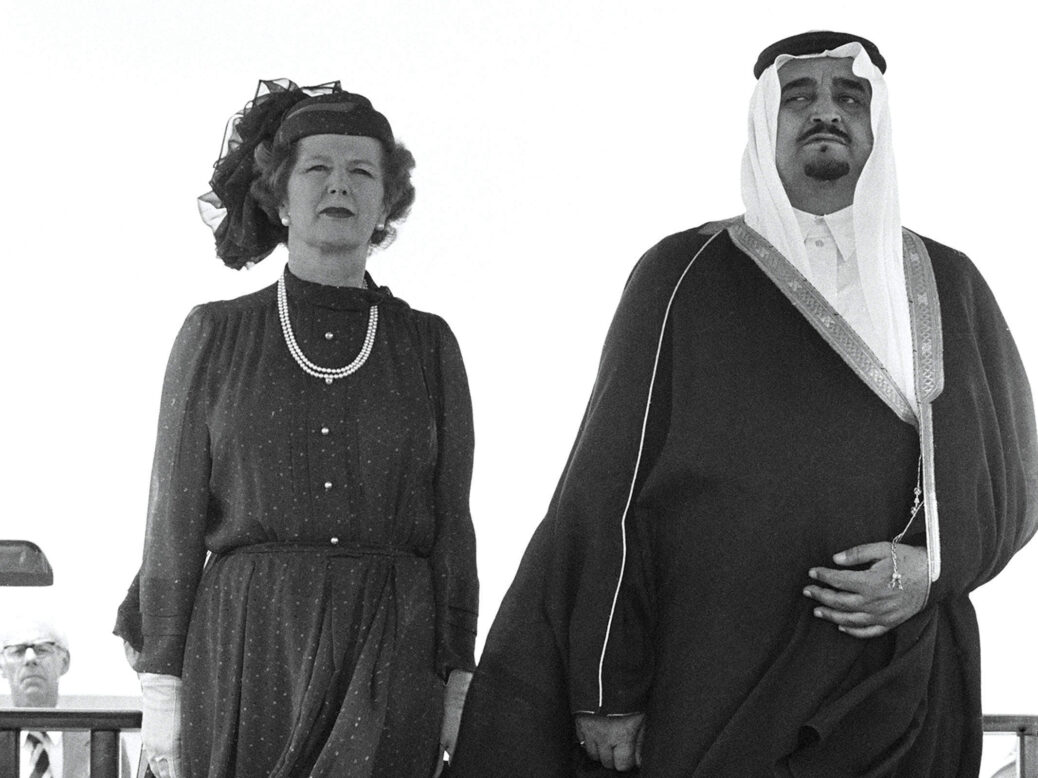
Deception in High Places: a History of Bribery in Britain’s Arms Trade
Nicholas Gilby
Pluto Press, 256pp, £15.99
As I began this heroically dogged and at times obsessive book about British connivance in illegal payments to secure arms deals over the past half-century, there were calls for the 2022 World Cup to be taken away from Qatar. The Gulf state’s football authorities had allegedly passed $5m to African officials to buy their support for Qatar’s unlikely bid to host the finals. And as I was finishing this short exposé – a dense and involved read – there was a counterclaim accusing the English FA of having made illegal payments during the World Cup 2018 bidding process.
Other countries are corrupt – Arabs and Africans, yes, but us? Unthinkable. However, it is just that tendency to think of foreigners as naturally venal, Nicholas Gilby suggests, that has led British companies to pay many millions of pounds’ worth of bribes since the 1960s: bribes that render the giver as complicit as the taker.
Gilby assiduously unveils past sins with contemporary consequences – not least our continuing and largely acquiescent relationship with Saudi Arabia and the BAE al-Yamamah arms contract, made possible by Margaret Thatcher’s energetic lobbying. He draws on years of research; and his freedom of information victory over the Foreign and Commonwealth Office released a stash of documents that provide the evidence for this occasionally devastating indictment.
My own investigations into the weapons business have been concerned with the worldwide proliferation of small arms, but the UK mainly flogs big-ticket stuff: fighter bombers, tanks and radar systems. Many of these, unlike AK-47s, remain unused and it can be argued that the real damage they do is in their commission and sale. Take South Africa where, Gilby suggests, the money siphoned from the national budget and into corrupt arms deals was directly responsible for the death of thousands. In 1999, South Africa signed up for defence contracts costing $5bn; at the same time, President Thabo Mbeki said that the country couldn’t afford to extend antiretroviral medication to five million HIV-infected citizens. Between 2000 and 2005, according to Harvard University research cited by Gilby, 330,000 South Africans died because they could not afford treatment for HIV or Aids.
Despite the tragedy, a colourful cast makes parts of this book read like farce. Bent Dutch princes and Japanese prime ministers on the take flit across the pages. They are joined by aristocrats of doubtful provenance and clubbable Terry Thomas-like figures such as Geoffrey Edwards, the “hard-drinking”, Jeddah-based expat and intimate of the Saudi royal family who was used by AEI and BAC to keep themselves at a remove from the many princes who needed sweetening.
Few, though, can compare for entertainment value with Sir Shapoor Reporter, a conduit in the 1970s for British payments (through a front company) to secure a deal to equip the Iranian army with Chieftain tanks. Negotiations were carried out in an atmosphere of secrecy and intrigue, much of which was attributable to the eccentricity of the shah but also because Reporter was working for both the UK and Tehran. An Iranian with British citizenship, he taught the shah’s second wife to speak English and was regarded as onside by Brits – mainly because he was an SIS agent. He was also on a large commission.
The UK got the deal and by early 1978 the shah was using his Chieftains to suppress student protesters. When protest turned to revolution in 1979, “Panic broke out within the Ministry of Defence.” The new Iranian regime cancelled the arms contracts. It was King Hussein of Jordan who took on the spare order for tanks, allowing the Royal Ordnance Factory in Leeds to stay open – a reminder of why British politicians of all stripes have been relaxed about what it requires to seal an arms deal.
An American politician emerges as one of the few heroes in this book. Within a year of coming to office in 1977, President Jimmy Carter pushed through the Foreign Corrupt Practices Act. This was as much a practical measure as a product of the Georgia Baptist’s moral character. As a Congress report put it: “Improper payments . . . lend credence to the suspicions sown by foreign opponents of the United States that American enterprises exert a corrupting influence on the political processes of their nations.”
It wasn’t enough, however, to save the shah or to stop the Iran hostage crisis of 1979 and prevent Carter’s consequent defeat by Ronald Reagan in the 1980 US presidential election. But it did put in place the legislation that was used against BAE in 2010, when the company was fined $400m for making secret payments to secure eastern European arms deals. The same judgment highlighted cash transfers to Swiss bank accounts linked to al-Yamamah – a deal by then worth more than £40bn – and BAE pleaded guilty to false accounting and making misleading statements.
The UK Serious Fraud Office investigation into al-Yamamah was halted in 2006 amid the Saudis’ fury at the prospect of their own corruption being exposed. As the carnage in the Middle East vies with the 2014 World Cup for our attention today, it is worth recalling Tony Blair’s explanation of just why the decision to drop the case was a good thing.
“Our relationship with Saudi Arabia,” said the then prime minister, “is vitally important for our country in terms of counterterrorism, in terms of the broader Middle East, in terms of helping in respect of Israel and Palestine.” All of which, eight years later, is going swimmingly.
Michael Hodges is author of “AK-47: the Story of the People’s Gun” (Sceptre ebook, £3.95)





